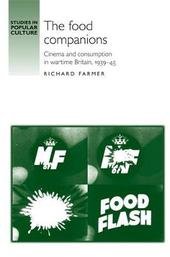
|
The Food Companions: Cinema and Consumption in Wartime Britain, 1939-45
Hardback
Main Details
| Title |
The Food Companions: Cinema and Consumption in Wartime Britain, 1939-45
|
| Authors and Contributors |
By (author) Richard Farmer
|
| Series | Studies in Popular Culture |
|---|
| Physical Properties |
| Format:Hardback | | Pages:272 | | Dimensions(mm): Height 234,Width 156 |
|
| Category/Genre | British and Irish History |
|---|
| ISBN/Barcode |
9780719083136
|
| Classifications | Dewey:941.084 |
|---|
| Audience | | Undergraduate | | Postgraduate, Research & Scholarly | |
|---|
| Illustrations |
Illustrations, black & white
|
|
Publishing Details |
| Publisher |
Manchester University Press
|
| Imprint |
Manchester University Press
|
| Publication Date |
31 August 2011 |
| Publication Country |
United Kingdom
|
Description
The introduction of rationing in January 1940 ensured that food became a central concern for the British people during the Second World War. The food companions investigates the cinema of this period and demonstrates the cultural impact that rationing and food control had on both government propaganda and commercial feature films. Combining archival research, detailed film analysis, and the extensive use of contemporary documents and resources, this book is the first to fully address the extensive propaganda work of the Ministry of Food both inside and outside the cinema. It also explores the tensions contained in images of communal dining, investigating the role that food played in Gainsborough's narratives of excess and identifying and analysing a cycle of black-market feature films. Lively and illuminating, The food companions will be welcomed by film scholars, historians, students, and anyone who has ever wondered about the important contribution that tea made during the war to shaping ideas of Britishness. -- .
Author Biography
Richard Farmer is Leverhulme Early Career Fellow in Film Studies at University College London
ReviewsThe Food Companions is an outstanding book. It provides a comprehensive and wide-ranging account of food and consumption habits in British society during a time of national crisis. Thoroughly researched, elegantly written, attractively illustrated, and frequently humorous, the book should appeal to scholars interested in cultural, film and social history. -- .
|